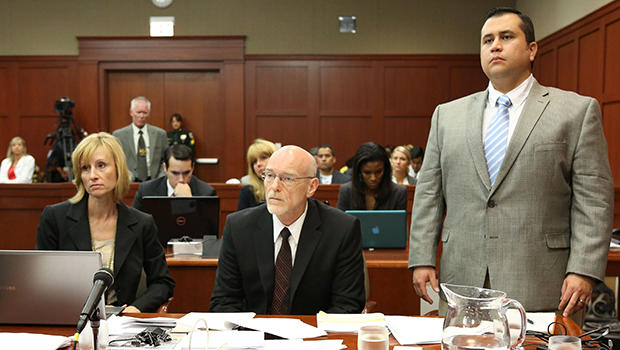George Zimmerman trial: Prosecutor blasts Zimmerman's self-defense claim during closing arguments
(CBS/AP) SANFORD, Fla. -- Court recessed for the day Thursday after a prosecutor gave emotional closing arguments in the George Zimmerman case, aiming for a second-degree murder conviction for the former neighborhood watch volunteer he described as a "wannabe cop."
READ: Trayvon Martin Shooting: A timeline of events
PICTURES: George Zimmerman on trial in death of Fla. teen
Court was set to resume Friday morning, when Zimmerman's defense is expected to launch their closing arguments. Zimmerman, 29, is charged in the shooting death of Florida teen Trayvon Martin.
Prosecutor Bernie de la Rionda portrayed Zimmerman as a "wannabe cop" who profiled Martin -- who he said was a boy only several weeks past his seventeeth birthday -- as a criminal. But he told the jury that it was Martin, not Zimmerman, who had reason to be in fear that evening.
"Who started this? Who followed who? Who was minding their own business? Of the two, who was the one that was armed?" de la Rionda asked the jury.
Martin, he said, would "no longer walk this Earth" because of Zimmerman's incorrect assumptions about the teen.
Playing Zimmerman's videotaped re-enactment of the altercation, de la Rionda aimed to poke holes in Zimmerman's self-defense story, saying the 29-year-old lied about following Martin.
Zimmerman claimed he got out of his car to find an address to give to non-emergency dispatchers, de la Rionda argued, but pointed out there was an address close by he could have offered without walking further into the neighborhood.
Zimmerman also claimed not to know the names of the streets in his community, de la Rionda said, though there were only three streets and he had lived there several years.
"If he's not doing anything wrong in following an individual, why does he have to lie about it?" de la Rionda asked.
The six jurors will have three options when they start deliberations as early as Friday: guilty of second-degree murder, guilty of manslaughter and not guilty.
Defense attorney Don West had argued for an all-or-nothing strategy, saying the jury's only options should be guilty of second-degree murder or not guilty altogether.
"The state has charged him with second-degree murder. They should be required to prove it," West said. "If they had wanted to charge him with manslaughter ... they could do that."
To win a second-degree murder conviction, prosecutors must prove Zimmerman showed ill will, hatred or spite - a burden the defense has argued the state failed to meet. To get a manslaughter conviction, prosecutors must show only that Zimmerman killed without lawful justification.
In his closing statements, de la Rionda said the profanity-laced language he used to describe Trayvon Martin in a non-emergency call with dispatchers - f---ing punks and these -holes - showed ill will and spite.
Early in the day Thursday, an irate West called a prosecution request for the jury to also consider felony third-degree murder "outrageous."
"Just when I thought this case couldn't get any more bizarre," West said.
The lesser charge would have been premised on the idea that Zimmerman committed child abuse when he shot and killed Martin, 17. A judge denied the request.
Court is set to resume at 8:30 a.m. Friday.
Complete coverage of the George Zimmerman Trial-Trayvon Martin case on Crimesider
READ: Trayvon Martin Shooting: A timeline of events

